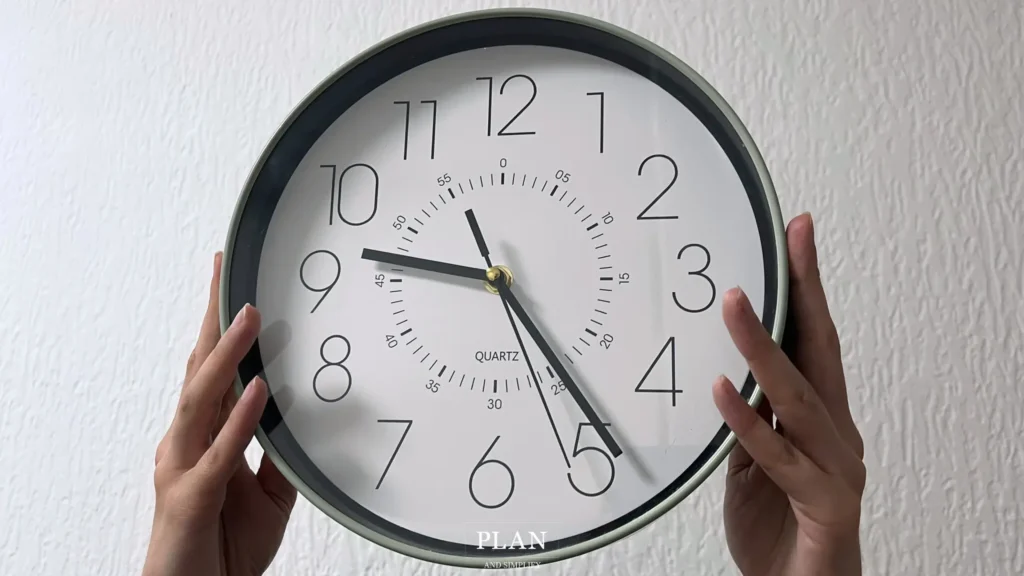If you’re constantly feeling behind, stressed about deadlines, or sacrificing your personal time for work, there are specific warning signs that show it’s time to make a change.
I know you’ve been there too – comparing yourself to that colleague who seems to have it all together while you’re drowning in tasks. When I realized I was in that exact place, I worked to identify what was draining me and how I could better manage my time in the workplace. Here’s what to watch for and how I learned to recognize these patterns in my own work life, plus what exactly you can use to manage your time better.
The Hidden Problem Behind Poor Time Management in the Workplace
The problem isn’t that we don’t have enough hours in the day. The real issue is that most of us are working reactively instead of strategically. We’re constantly responding to whatever feels urgent instead of focusing on what’s important, so we’re always behind, always stressed, and never feel like we’re making any real progress.
I see this everywhere in corporate environments. People are busy all day but feel like they accomplished nothing meaningful. They’re staying late not because they have more work than everyone else, but because they’re spending their energy on the wrong things at the wrong times. They’re managing their tasks instead of managing their time and energy.
P.S. You can check out what type of organizer you are and which tools I recommend trying out!
Why Is This a Problem?
This reactive approach to work creates a domino effect that impacts every area of your life. When you’re not in control of your time at work, you lose control of your personal time too. You bring work stress home, you sacrifice relationships, and you never feel like you can fully relax because there’s always something hanging over your head.
From a career perspective, being constantly reactive means you’re never working on the high-impact projects that get you noticed and promoted. You become known as someone who handles whatever gets thrown at them, not as someone who drives results and thinks strategically. Your reputation becomes about being busy rather than being effective.
The stress of poor time management also affects your health and decision-making. When you’re always behind and always stressed, you make worse choices about everything from what you eat to how you communicate with your team. You start avoiding challenges because you know you’re already overwhelmed, which limits your growth and opportunities.
For me, time management in the workplace isn’t about squeezing every minute out of the day or becoming some productivity robot. What’s important is having enough control over my workday so that I can leave the office without that nagging feeling that I’m forgetting something important. I think we see the real value of effective time management at the end of the work day. It means I’m not staying late every night, I’m not bringing work stress home, and I have energy left for my personal life.
Here Are the Exact Signs of Poor Time Management
After managing teams and watching countless talented people struggle with the same issues I faced, I’ve noticed patterns in how poor time management shows up. These are warning signs that your current approach isn’t sustainable. I too experienced these, and recognizing them was the first step toward making real changes in how I work.
| Time Management Signs | What It Looks Like | Impact on Your Life |
|---|---|---|
| Always Playing Catch-Up | Working backwards from deadlines, constant crisis mode | Stress, poor work quality, weekend work |
| Can’t Find Important Documents | Wasting time searching for files and emails daily | Looking unprepared, team delays, anxiety |
| Say Yes to Everything | Agreeing to all requests without considering workload | Mediocre work, resentment, boundary issues |
| Constantly Putting Out Fires | Reacting to urgent issues instead of strategic work | Always behind on goals, high stress levels |
| Check Phone/Email Constantly | Anxious without checking messages every few minutes | Destroyed focus, artificial urgency |
| Feel Guilty When Not Working | Can’t enjoy personal time, always thinking about work | Burnout, damaged relationships, exhaustion |
Do you find yourself in any of these?
1. You’re Always Playing Catch-Up on Deadlines
This is when you find yourself constantly working backwards from due dates, scrambling to finish projects at the last minute. Instead of having a steady workflow, you’re in permanent crisis mode, staying late or working weekends to meet commitments you made weeks ago.
In the workplace, this creates a cycle where your stress affects your team’s morale and your reputation for reliability suffers. Your work quality drops because you’re rushing, and you start avoiding taking on new challenges because you know you’re already behind. The constant pressure affects your sleep and personal relationships because you’re always worried about what you haven’t finished.
I lived this way for my first three years working in corporate. I’d agree to deadlines that seemed reasonable in the moment, then find myself pulling late nights overthinking if I will manage it all in time. I realized I was terrible at estimating how long complex tasks actually took, especially when factoring in interruptions and other responsibilities. I had a breakthrough when I started tracking how long different types of work took me, not how long I thought they should take.
2. You Can’t Find Important Documents When You Need Them
This goes beyond just being disorganized. I’m talking about when you waste significant time every day searching for emails, files, or information you know you have somewhere. You might have multiple versions of the same document saved in different places, or you can’t remember if you responded to that important email from last week.
At work, this makes you look unprepared in meetings and slows down your entire team when they’re waiting for information from you. It creates anxiety because you’re never confident you have everything you need, and it wastes mental energy that should be focused on more important decisions. You start avoiding certain tasks because you know they’ll require finding information that will take forever to locate.
I had been saving everything to my desktop and email attachments randomly without any system. Now I use simple spreadsheets to categorize and track everything important, and I’ve set up my email with clear folders. It’s not fancy, but I can find what I need in under a minute. And btw, I love my clean desktop right now! It makes me satisfied having nothing but my computer icon, bin and my vision board wallpaper.
3. You Say Yes to Everything, Then Resent It
You automatically agree to every request, meeting invitation, or additional responsibility without considering your existing workload. You feel like saying no makes you a bad team player, so you keep adding to your plate until you’re overwhelmed and frustrated with everyone around you.
This people-pleasing approach backfires at work because you end up doing mediocre work on everything instead of excellent work on your actual job. Your colleagues start to rely on you for things that aren’t your responsibility, and you become the go-to person for tasks others should handle. The resentment builds because you feel taken advantage of, but you created the dynamic by never setting boundaries.
Learning to say no after my working hours became non-negotiable for me. If someone asks me to do something after 5PM or on weekends (it never happens at my current job, but oh boy, it did on the old one), the answer is no unless it’s a genuine emergency. It felt uncomfortable at first (still does), but I realized that my availability was enabling poor planning from others.

4. You’re Constantly Putting Out Fires Instead of Preventing Them
You know the days when your entire workday is spent reacting to urgent issues rather than working on important long-term projects. You feel busy and productive because you’re constantly solving problems, but you never have time for strategic thinking or planning that would prevent many of these fires from starting.
In the workplace, this approach means you’re always behind on big-picture goals and your team lacks clear direction. You become known as someone who handles crisis well, but you’re not seen as a strategic team player because you never have time to think beyond the immediate problem. Your stress levels stay high because there’s always another urgent issue waiting.
My background as a waitress in busy bars actually helped me here. I’m comfortable working under pressure and handling chaos. But I realized that what worked in hospitality was hurting me in corporate life. The constant firefighting was preventing me from doing the planning and strategic work that would help advance my career.
5. You Check Your Phone and Email Constantly
I’m not talking about being distracted. Talking about feeling anxious if you don’t check your messages every few minutes. Interrupting focused work to respond to non-urgent emails, and scrolling through your phone even when you have important tasks waiting.
The constant switching between tasks destroys your productivity and makes it impossible to do deep, thoughtful work. In meetings, you’re partially distracted by notifications, which affects your contribution and decision-making. The habit creates artificial urgency around everything because you’re always responding to whoever contacted you most recently instead of focusing on what’s actually important.
Working in an open office made this worse for me because I was already dealing with constant interruptions from people walking by. Adding phone notifications on top of that meant I never had my much needed focus time. I started putting my phone on do not disturb mode during my work hours and only checking email at specific times. Slack reminders became my friend for important follow-ups instead of trying to remember everything in the moment.
6. You Feel Guilty When You’re Not Working
Oh, this one hits the spot for me! This happens when you can’t enjoy your personal time because you’re thinking about work tasks you could be doing instead. You feel selfish for taking breaks, weekends feel too short because you’re dreading Monday, and you struggle to be present with family and friends because your mind is always on your to-do list.
This mindset leads to burnout and makes you less effective at work because you never fully disconnect and recharge. Your personal relationships suffer and you lose touch with hobbies and interests that used to bring you joy. The irony is that this constant mental preoccupation doesn’t make you more productive.
I had to have a serious conversation with myself about why I was giving 110% to a company that could decide they don’t need me any day. Work is necessary for the lifestyle I want, but it shouldn’t be the main source of stress in my life or affect my health. If your job is impacting your personal life and well-being to this degree, it’s time to either set better boundaries or start looking for something better while building your options.
I Wanted to Learn How to Improve Time Management
Why is time management so important to me, that I dedicated this entire page to it? Well. As I mentioned in the beginning, I think we are all wired to think how others are much more organized, they can do it all and we can’t. A few years ago, I was talking to my friend (at the time we didn’t know each other so well, she was my colleague’s girlfriend but we clicked so we went out for a drink) and we started talking about our lives. I remember asking her “I don’t know how you manage it all, working, studying, having a life?” and she was like “I wanted to ask you the same!” And then we realized that no, neither one of us had it all together, an always clean house, work going well, studies thriving. We were both doing the best we could.
This was all like almost 10 years ago, and I still worked as a waitress. But fast forward to my corporate life now, I see that I was still doing the same, and trying to be as good as other girls “were”. I was tired of feeling behind all the time and spending my evenings catching up on tasks I should have finished during the day. I also got tired of being the person everyone could count on to say yes to everything, which meant I was doing work that wasn’t even my responsibility. So I started researching how can i improve my time management in the workplace, not because I wanted to become some productivity guru, but because I wanted my life back.

What Are Good Time Management Skills I Should Have?
After trying various approaches and seeing what worked in my corporate environment, these are the skills that made the biggest difference for working women time management, in my opinion.
Essential time management skills everyone needs:
- Effective time management through energy-based scheduling (doing complex work when you’re the sharpest)
- Realistic time estimation for projects and tasks
- Setting and maintaining boundaries around your availability
- Prioritizing based on impact, not urgency
- Delegation and saying no to non-essential requests
- Creating simple systems for organizing information and tasks
- Planning your day the night before to avoid decision fatigue
- Building buffer time into your schedule for unexpected issues
- Batching similar tasks together
Time Management Tools I Started Using
I researched dozens of apps and systems, but honestly, most of them were too complicated for my actual workflow. I needed tools that would work in my corporate environment without adding more complexity to my day.
Tools that work for me:
- Google Calendar Tasks for deadline reminders and follow-ups
- Simple spreadsheets for categorizing and prioritizing everything
- Slack reminders for important work follow-ups
- Written notes and daily plans (old school but effective)
- Phone’s built-in timer for time-boxing tasks
- Calendar blocking for focused work time
- iPhone’s Work mode during peak productivity hours
- Android users can try Focus mode for similar functionality
- Simple note-taking apps like Apple Notes or Google Keep
- Email folders and filters for better organization
Time Management Template I Created
After trying various planners and systems that didn’t quite fit my needs, I created a simple daily tracker that works for my schedule. It features a timeline from 6 AM to 10 PM with space for reminders, notes, and top priorities, basically everything I need to stay organized without overthinking it. The template helps me plan my energy around my most important tasks and track what’s taking up my time. You can find this free printable on my site because I believe every busy woman deserves tools that work for real life, not perfect Instagram scenarios.
You can find this free printable on my site because I believe every organized person deserves tools that work for real life, not perfect Instagram scenarios.
My Thoughts After Working on This
The changes didn’t happen overnight, but after consistently applying these strategies for several months, I feel like I have control over my workday instead of it controlling me. I leave the office knowing I’ve accomplished what I had to do that day, and I don’t spend my evenings thinking about everything I didn’t finish. Most importantly, I have energy and time for the life I want outside of work.
The biggest shift was realizing that time management in the workplace is about doing what matters without sacrificing your wellbeing in the process.
FAQ
Here are the questions I get most often from other corporate girls who are struggling with the same issues I faced.
Good time management reduces your stress, improves your work quality, and gives you back your personal time. It also makes you more valuable as an employee because you can focus on high-impact work instead of constantly putting out fires.
Time management is being intentional about how you spend your work hours so you can accomplish your priorities without feeling overwhelmed or sacrificing your personal life.
Poor time management creates a cycle of stress, rushed work, missed deadlines, and burnout. It affects your health, relationships, and career growth because you’re always in reactive mode instead of being strategic.
When you manage your time well at work, you can actually leave work at work. You finish your priorities during business hours instead of bringing tasks home or working weekends, which gives you real time for yourself and your relationships.
Better time management improves your work quality because you’re not rushing through tasks. You have time for strategic thinking, can meet deadlines consistently, and can take on more challenging projects that advance your career.
